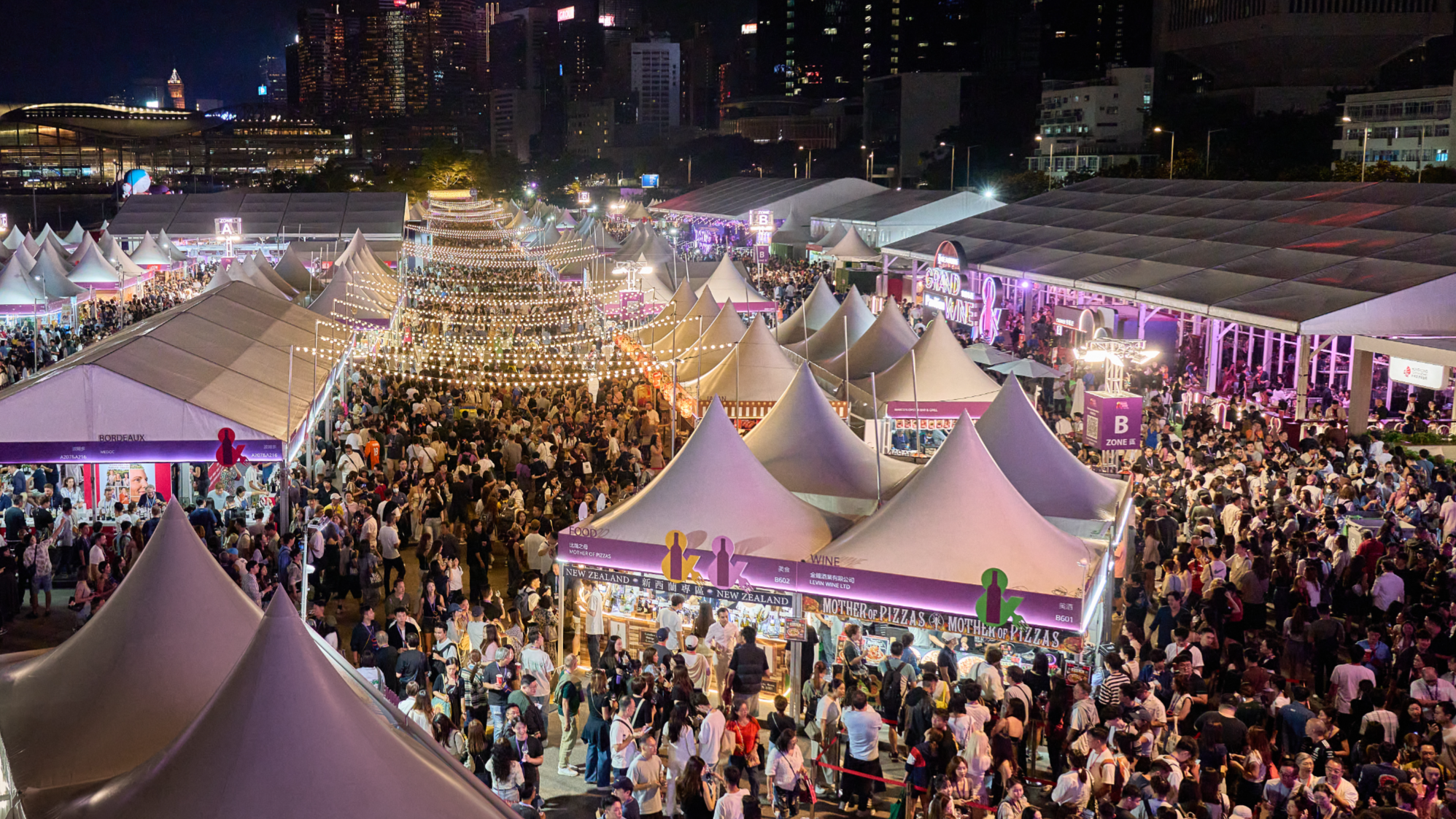
Hong Kong is a dynamic springboard for many Chinese mainland businesses aiming to expand onto the global stage. Nowhere is this more evident than in the wine and spirits industry, in which Chinese brands are seizing opportunities to broaden their footprint and share China’s unique drinking culture with a wider audience through the city’s annual wine extravaganza.
The four-day Hong Kong Wine and Dine Festival, held at the city’s Central Harbourfront, wrapped up on Sunday with a turnout of 163,000 visitors, according to organizer the Hong Kong Tourism Board. Compared to last year, the average daily attendance increased by more than 30 percent. Spending enthusiasm also soared, with visitor expenditures at the event rising by at least 40 percent.
Showcasing over 300 booths, the festival featured a rich tapestry of beverages from 31 countries and regions, such as classic wines from France and Spain, spirits from Britain and the United States, as well as beers from local breweries and beyond.
READ MORE: Fine wine, high spirits
Among this year’s diverse offerings, Chinese products piqued the interest of many wine lovers as the country’s fast-growing wine industry has gained recognition from more overseas markets in recent years.
Xige Estate, a prominent winery from Northwestern China’s Ningxia Hui autonomous region — the country’s leading wine-producing region — has marked its third consecutive appearance at the festival. “We participate mostly for brand promotion. But since the very first year, we are doing great business,” said Christelle Chene, the winery’s brand ambassador.
Although Xige’s products are exported to many places, including Singapore, Switzerland, and France, Hong Kong is the biggest market outside the mainland, according to Chene. “We are always happy to come, because there are wine industry people here and also a lot of consumers,” she said.
The France-born industry veteran moved to Ningxia seven years ago to help establish the winery. Chene said many foreign customers she has talked to are surprised by the quality of Chinese wines.
“People usually don’t expect them to be good … So it’s very important to show foreign markets, where a lot of people drink wine every day, that Chinese wine is already very good,” she added.
Chene said she believes promoting Chinese wine also helps promote the country’s culture. “Wine is an international language. I think it's the best way to communicate with the world.”
The wine festival has also served as a key platform for many emerging brands eager to broaden their reach. Lavie — a winery based in North China’s Inner Mongolia autonomous region — returned for its second appearance at the event with more products after last year’s better-than-expected sales performance, according to representative Liu Boyang.
Liu, who previously studied at a Hong Kong university, said the city values cultural diversity, making it an ideal place to promote Lavie, which embodies traditional Mongolian cultural elements into both its packaging and brand identity.
The young winery, having only begun commercialization a few years ago, has limited distribution channels in the city. Through the event, Liu said his brand has forged connections with many industry stakeholders and customers.
Looking ahead, Liu expects more support from the Hong Kong Special Administrative Region government and to meet more international buyers in the city, which he believes will help advance Lavie’s expansion ambitions.
“We already have a presence in Britain and several other European markets, as well as Hong Kong and Macao,” he said. “We’re also trying to expand into Southeast Asia and countries including Japan and South Korea.”
Also aiming for the international market is Luetong, a new sauce-aroma baijiu brand born in Hong Kong, with products manufactured in Maotai, Guizhou province, the key hub of China’s baijiu industry.
READ MORE: Coming of age
Founder Endy Chan told China Daily that the brand is now targeting to enter a few overseas markets, such as Malaysia and Vietnam.
As a baijiu enthusiast himself, Chan said many people outside of the Chinese market are unfamiliar with this kind of spirit. “That’s why we have bilingual Chinese-English descriptions on the packaging to guide consumers on how to properly appreciate sauce-aroma baijiu.”
Through brand education, Chan said he hopes to raise people’s awareness and acceptance of this unique category of Chinese liquor, and promote its distinctive brewing techniques, rich history, and cultural knowledge to the world.
Contact the writers at gabylin@chinadailyhk.com



